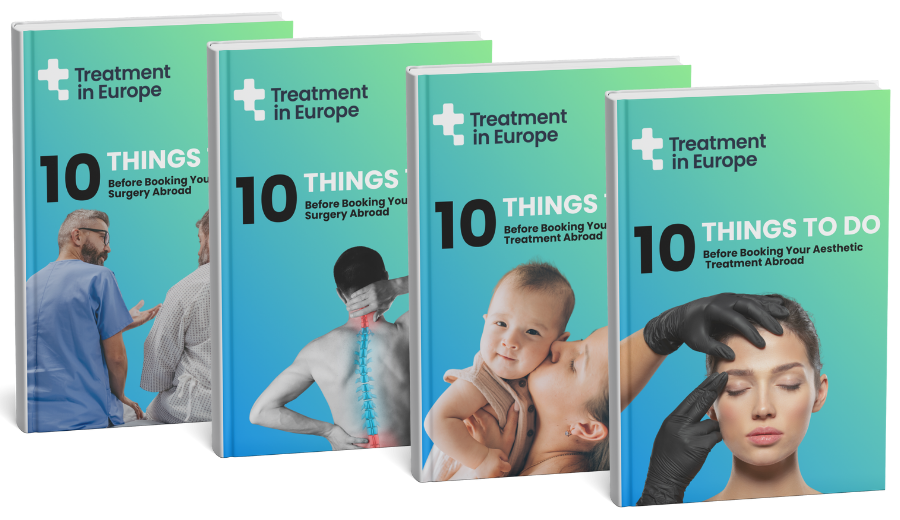.png)
IVF and Fertility Procedures in Europe: Your Comprehensive Guide
Fertility challenges affect millions worldwide, but advanced medical technology and high-quality care have made IVF and other fertility treatments more accessible than ever. Europe stands as a leading destination for individuals and couples seeking effective fertility procedures tailored to diverse needs. In this guide, we'll explore everything you need to know about IVF in Europe, from procedure details and clinic selection to legal aspects, costs, and your next steps for starting a family.
Understanding Fertility Treatments: What is IVF?
In vitro fertilization (IVF) is one of the most popular and effective fertility procedures for overcoming a range of reproductive obstacles. The process involves fertilizing an egg with sperm outside the body and transferring the resulting embryo into the uterus. IVF is just one of several fertility treatments available in Europe today.
Why Choose Europe for Fertility Procedures?
Europe offers a robust landscape of fertility clinics recognized for their expertise, patient-centric care, and cutting-edge technology. Here’s why many choose Europe for fertility procedures:
- High success rates due to advanced technologies and experienced specialists.
- Comprehensive legal frameworks supporting various treatments, including egg and sperm donation.
- Cost-effective options compared to many other regions worldwide.
- Accessible travel for international patients, with many clinics catering to English speakers.
Popular Types of Fertility Treatments in Europe
1. In Vitro Fertilization (IVF)
IVF is the foremost fertility procedure, suitable for a wide range of diagnoses, including blocked fallopian tubes, male infertility, or unexplained infertility. The method has evolved with options like frozen embryo transfer (FET) and personalized medication protocols, boosting pregnancy rates.
2. Intracytoplasmic Sperm Injection (ICSI)
ICSI is often combined with IVF, involving a single sperm being injected directly into an egg. It’s particularly effective for severe male factor infertility.
3. Egg and Sperm Donation
For individuals and couples facing specific reproductive challenges, donor eggs or sperm can dramatically increase the chances of conception. European clinics offer regulated donor programs, with many countries permitting both anonymous and non-anonymous donations.
4. Preimplantation Genetic Testing (PGT)
PGT helps identify genetic abnormalities in embryos before transfer, improving success rates and reducing the risk of inherited diseases. This advanced screening is available in many European centers as part of the IVF process.
The IVF Process: Step-by-Step Overview
While each clinic may slightly tailor its approach, a typical IVF journey in Europe usually follows these key stages:
- Initial consultation: Medical assessment and discussion of your fertility history.
- Ovarian stimulation: Hormonal medications stimulate multiple egg development.
- Egg retrieval: A minimally invasive procedure to collect mature eggs.
- Fertilization: Eggs are combined with sperm in the laboratory.
- Embryo culture: Embryos are monitored for several days as they develop.
- Embryo transfer: One or more embryos are carefully placed into the uterus.
- Pregnancy test: Two weeks after transfer, a blood test confirms pregnancy.
For more insights into the IVF procedure, visit our IVF Treatment page.
Success Rates and Factors Affecting IVF Outcomes
IVF success rates vary across Europe and depend on several factors:
- Maternal age: Younger women generally have higher success rates.
- Underlying health conditions: Both male and female factors play roles in outcome.
- Embryo quality: Advanced screening techniques help select the best embryos.
- Clinic expertise: Accreditation and experience are vital. Choose clinics with transparent reporting of outcomes.
European clinics typically report success rates of 30–50% per embryo transfer for women under 35, with rates declining in older age groups.
Legal and Ethical Considerations
Europe is characterized by varied legislation regarding fertility procedures:
- Age Limits: Some countries set age maximums for treatment eligibility.
- Anonymity of Donors: Donation laws differ; some countries offer only non-anonymous donation.
- Same-sex Couples and Single Parents: Acceptance varies by country, so research eligibility criteria before selecting a destination.
Consult a reputable clinic or legal advisor for country-specific guidance on IVF and other fertility treatments.
Choosing the Right Fertility Clinic Abroad
Selecting your fertility clinic is one of the most important decisions on your journey. Here's what to consider:
- Clinic accreditation and certifications (e.g., ESHRE, ISO, JCI)
- Specializations matching your medical needs (e.g., IVF, donor programs, genetic testing)
- Transparent pricing and clear explanations of costs
- Multilingual support for international patients
- Patient testimonials and published success rates
On Treatment in Europe, you can compare clinics, services, and prices to find what best suits your family-building goals.
IVF Cost Comparison in Europe
The cost of IVF and additional fertility procedures in Europe typically ranges from €2,500 to €8,000 per cycle, depending on country, clinic, and treatment complexity. Factors influencing cost include:
- Inclusion of ICSI, PGT, or donor gametes
- Laboratory technology and facility standards
- Medication and aftercare support
- Number of cycles anticipated
Some countries offer exceptionally competitive prices or public funding for citizens. For a detailed breakdown of fertility treatment expenses, view our IVF price comparison guide.
Planning Your Treatment Abroad: Tips and Advice
Here are essential steps for a smooth IVF journey in Europe:
- Gather your complete medical history and records for clinic review.
- Consider the best time to travel; align treatment scheduling with personal commitments.
- Organize accommodations and local transportation in advance.
- Clarify legal documentation, especially for donor cycles or surrogacy.
- Schedule follow-up support, whether in your home country or with the clinic abroad.
Many clinics offer dedicated coordinators to guide international patients through paperwork, travel, and recovery, ensuring comfort and peace of mind.
Frequently Asked Questions (FAQ) About IVF and Fertility Procedures
- Is IVF painful? Most patients report minimal discomfort during egg retrieval; hormonal side effects may vary.
- How many IVF cycles are recommended? On average, 1–3 cycles may be suggested, depending on patient age and response.
- Are there any risks? Like all medical procedures, IVF carries some risks such as OHSS (ovarian hyperstimulation syndrome) and multiple pregnancy, but clinics monitor closely to minimize complications.
- Can I choose the gender of my baby? Non-medical gender selection is regulated and generally not permitted in most European countries.
- How long should I plan to stay abroad for an IVF cycle? Most patients require 2–3 weeks in-country for monitoring, retrieval, and transfer.
Conclusion: Begin Your Fertility Journey with Confidence
Choosing IVF or fertility treatments in Europe offers a blend of high medical standards, experienced practitioners, and an encouraging pathway to parenthood for those facing fertility obstacles. With comprehensive information, supportive legal frameworks, and world-renowned clinics, your dream of building a family is within reach.
Take the first step towards a brighter, fuller future—connect with a recommended specialist today!
Get our free "Ultimate Pre-Treatment Abroad Checklist"
Planning treatment abroad can be overwhelming - but it doesn’t have to be. Our “Ultimate Pre-Treatment Abroad Checklist” guides you step-by-step through everything you need to do before booking your procedure abroad.
Looking for treatment options? We can help you find the best care abroad in 24-48h!

Get the medical Care You Need at 50–70% Less

EU-Certified Clinics
.svg)
Short waiting time
Get clinic quotes in 24-48h — free & no commitment
What's next?
- Get a quote for procedure
- Consultation with our coordinator
- Confirm the quote
- Arrange your travel


